Industrial Revolution: Transformations, Working Class Impact, Britain
VerifiedAdded on 2022/08/28
|11
|2921
|15
Essay
AI Summary
This essay delves into the profound impact of the Industrial Revolution, which dramatically reshaped Britain and the world from the late 18th century onward. It begins with an overview of the revolution, highlighting the shift from an agrarian to an industrialized economy, and the introduction of new technologies like the steam engine and the cotton gin. The essay then explores the key transformations that occurred during this period, including population growth, urbanization, and advancements in transportation and communication. It examines the rise of factories, the emergence of a new middle class, and the significant economic and social changes that redefined British society. A crucial aspect of the essay focuses on the effects of the revolution on the British working class, detailing the harsh working conditions, the shift in family structures, and the beginnings of labor movements. The essay also touches upon the impact of the revolution on the working class and the development of various technologies.
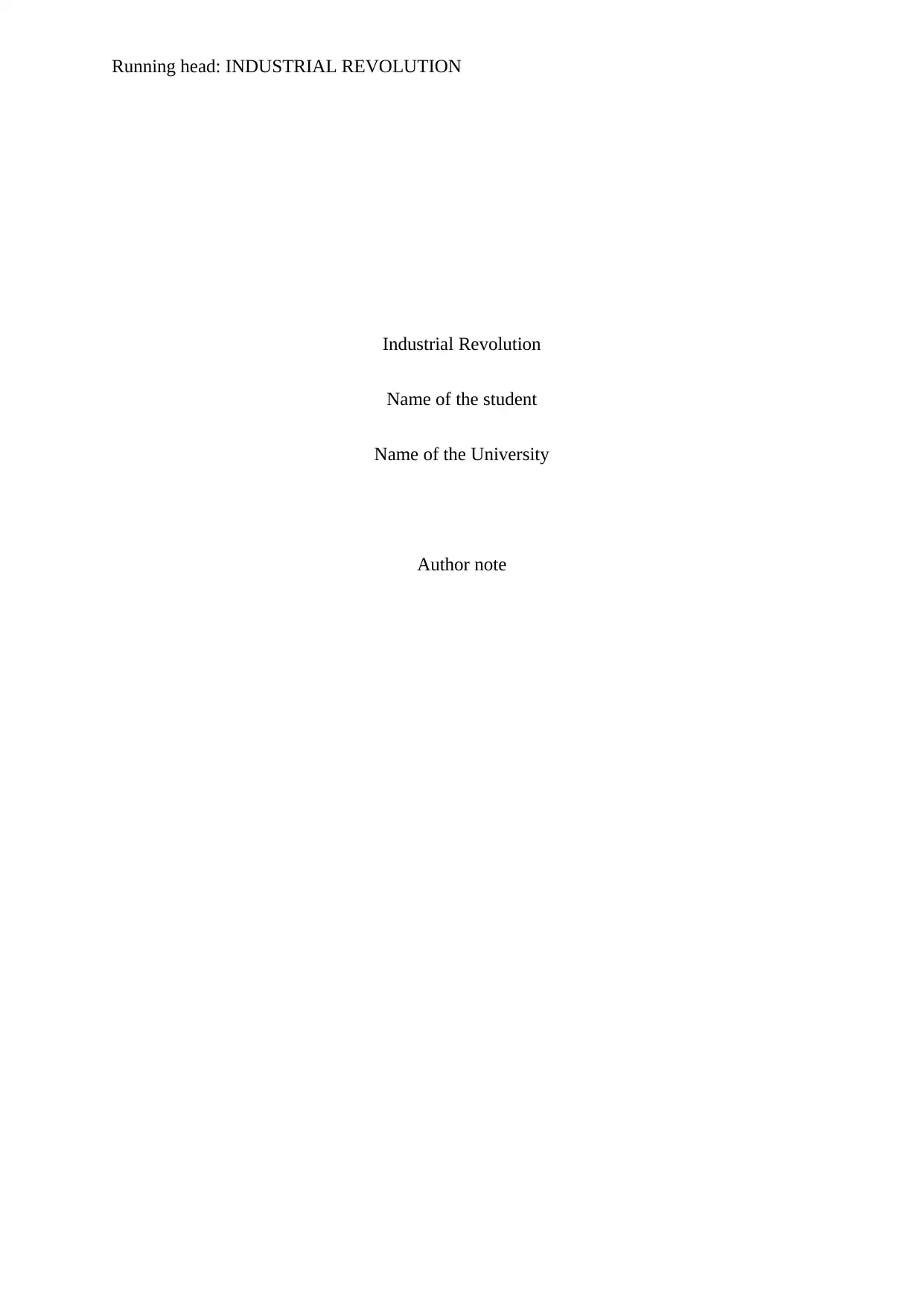
Running head: INDUSTRIAL REVOLUTION
Industrial Revolution
Name of the student
Name of the University
Author note
Industrial Revolution
Name of the student
Name of the University
Author note
Paraphrase This Document
Need a fresh take? Get an instant paraphrase of this document with our AI Paraphraser
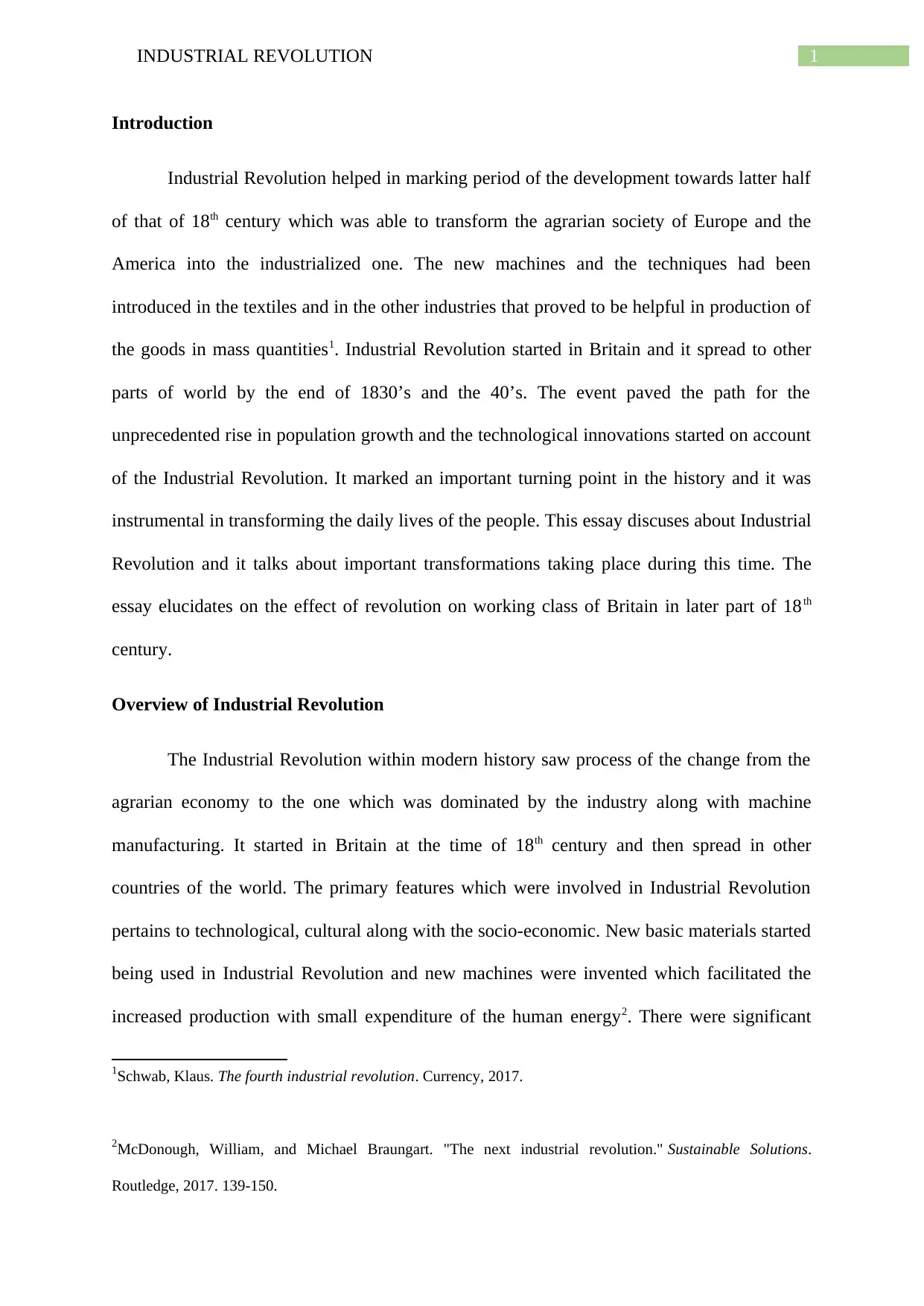
1INDUSTRIAL REVOLUTION
Introduction
Industrial Revolution helped in marking period of the development towards latter half
of that of 18th century which was able to transform the agrarian society of Europe and the
America into the industrialized one. The new machines and the techniques had been
introduced in the textiles and in the other industries that proved to be helpful in production of
the goods in mass quantities1. Industrial Revolution started in Britain and it spread to other
parts of world by the end of 1830’s and the 40’s. The event paved the path for the
unprecedented rise in population growth and the technological innovations started on account
of the Industrial Revolution. It marked an important turning point in the history and it was
instrumental in transforming the daily lives of the people. This essay discuses about Industrial
Revolution and it talks about important transformations taking place during this time. The
essay elucidates on the effect of revolution on working class of Britain in later part of 18th
century.
Overview of Industrial Revolution
The Industrial Revolution within modern history saw process of the change from the
agrarian economy to the one which was dominated by the industry along with machine
manufacturing. It started in Britain at the time of 18th century and then spread in other
countries of the world. The primary features which were involved in Industrial Revolution
pertains to technological, cultural along with the socio-economic. New basic materials started
being used in Industrial Revolution and new machines were invented which facilitated the
increased production with small expenditure of the human energy2. There were significant
1Schwab, Klaus. The fourth industrial revolution. Currency, 2017.
2McDonough, William, and Michael Braungart. "The next industrial revolution." Sustainable Solutions.
Routledge, 2017. 139-150.
Introduction
Industrial Revolution helped in marking period of the development towards latter half
of that of 18th century which was able to transform the agrarian society of Europe and the
America into the industrialized one. The new machines and the techniques had been
introduced in the textiles and in the other industries that proved to be helpful in production of
the goods in mass quantities1. Industrial Revolution started in Britain and it spread to other
parts of world by the end of 1830’s and the 40’s. The event paved the path for the
unprecedented rise in population growth and the technological innovations started on account
of the Industrial Revolution. It marked an important turning point in the history and it was
instrumental in transforming the daily lives of the people. This essay discuses about Industrial
Revolution and it talks about important transformations taking place during this time. The
essay elucidates on the effect of revolution on working class of Britain in later part of 18th
century.
Overview of Industrial Revolution
The Industrial Revolution within modern history saw process of the change from the
agrarian economy to the one which was dominated by the industry along with machine
manufacturing. It started in Britain at the time of 18th century and then spread in other
countries of the world. The primary features which were involved in Industrial Revolution
pertains to technological, cultural along with the socio-economic. New basic materials started
being used in Industrial Revolution and new machines were invented which facilitated the
increased production with small expenditure of the human energy2. There were significant
1Schwab, Klaus. The fourth industrial revolution. Currency, 2017.
2McDonough, William, and Michael Braungart. "The next industrial revolution." Sustainable Solutions.
Routledge, 2017. 139-150.
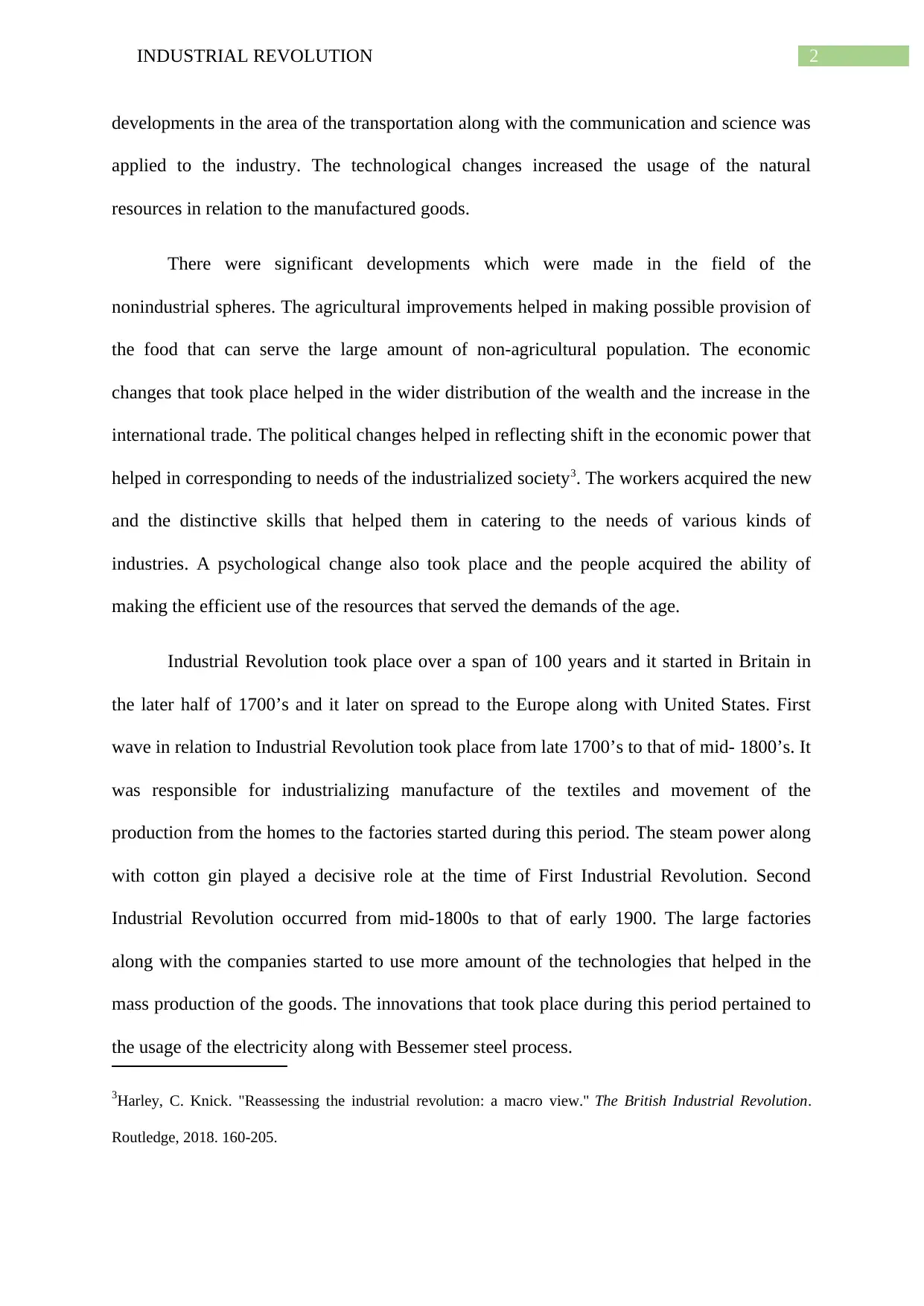
2INDUSTRIAL REVOLUTION
developments in the area of the transportation along with the communication and science was
applied to the industry. The technological changes increased the usage of the natural
resources in relation to the manufactured goods.
There were significant developments which were made in the field of the
nonindustrial spheres. The agricultural improvements helped in making possible provision of
the food that can serve the large amount of non-agricultural population. The economic
changes that took place helped in the wider distribution of the wealth and the increase in the
international trade. The political changes helped in reflecting shift in the economic power that
helped in corresponding to needs of the industrialized society3. The workers acquired the new
and the distinctive skills that helped them in catering to the needs of various kinds of
industries. A psychological change also took place and the people acquired the ability of
making the efficient use of the resources that served the demands of the age.
Industrial Revolution took place over a span of 100 years and it started in Britain in
the later half of 1700’s and it later on spread to the Europe along with United States. First
wave in relation to Industrial Revolution took place from late 1700’s to that of mid- 1800’s. It
was responsible for industrializing manufacture of the textiles and movement of the
production from the homes to the factories started during this period. The steam power along
with cotton gin played a decisive role at the time of First Industrial Revolution. Second
Industrial Revolution occurred from mid-1800s to that of early 1900. The large factories
along with the companies started to use more amount of the technologies that helped in the
mass production of the goods. The innovations that took place during this period pertained to
the usage of the electricity along with Bessemer steel process.
3Harley, C. Knick. "Reassessing the industrial revolution: a macro view." The British Industrial Revolution.
Routledge, 2018. 160-205.
developments in the area of the transportation along with the communication and science was
applied to the industry. The technological changes increased the usage of the natural
resources in relation to the manufactured goods.
There were significant developments which were made in the field of the
nonindustrial spheres. The agricultural improvements helped in making possible provision of
the food that can serve the large amount of non-agricultural population. The economic
changes that took place helped in the wider distribution of the wealth and the increase in the
international trade. The political changes helped in reflecting shift in the economic power that
helped in corresponding to needs of the industrialized society3. The workers acquired the new
and the distinctive skills that helped them in catering to the needs of various kinds of
industries. A psychological change also took place and the people acquired the ability of
making the efficient use of the resources that served the demands of the age.
Industrial Revolution took place over a span of 100 years and it started in Britain in
the later half of 1700’s and it later on spread to the Europe along with United States. First
wave in relation to Industrial Revolution took place from late 1700’s to that of mid- 1800’s. It
was responsible for industrializing manufacture of the textiles and movement of the
production from the homes to the factories started during this period. The steam power along
with cotton gin played a decisive role at the time of First Industrial Revolution. Second
Industrial Revolution occurred from mid-1800s to that of early 1900. The large factories
along with the companies started to use more amount of the technologies that helped in the
mass production of the goods. The innovations that took place during this period pertained to
the usage of the electricity along with Bessemer steel process.
3Harley, C. Knick. "Reassessing the industrial revolution: a macro view." The British Industrial Revolution.
Routledge, 2018. 160-205.
⊘ This is a preview!⊘
Do you want full access?
Subscribe today to unlock all pages.

Trusted by 1+ million students worldwide
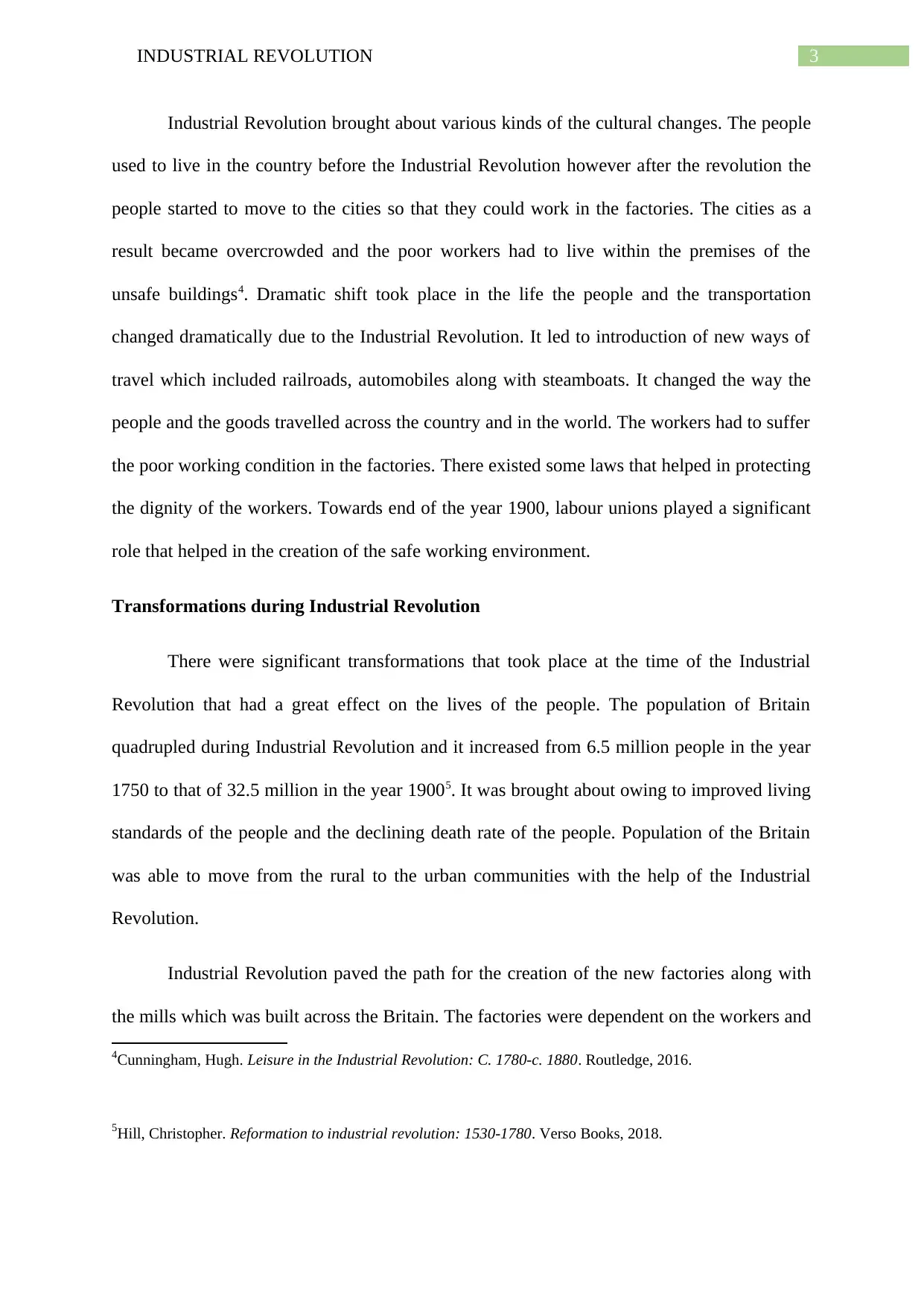
3INDUSTRIAL REVOLUTION
Industrial Revolution brought about various kinds of the cultural changes. The people
used to live in the country before the Industrial Revolution however after the revolution the
people started to move to the cities so that they could work in the factories. The cities as a
result became overcrowded and the poor workers had to live within the premises of the
unsafe buildings4. Dramatic shift took place in the life the people and the transportation
changed dramatically due to the Industrial Revolution. It led to introduction of new ways of
travel which included railroads, automobiles along with steamboats. It changed the way the
people and the goods travelled across the country and in the world. The workers had to suffer
the poor working condition in the factories. There existed some laws that helped in protecting
the dignity of the workers. Towards end of the year 1900, labour unions played a significant
role that helped in the creation of the safe working environment.
Transformations during Industrial Revolution
There were significant transformations that took place at the time of the Industrial
Revolution that had a great effect on the lives of the people. The population of Britain
quadrupled during Industrial Revolution and it increased from 6.5 million people in the year
1750 to that of 32.5 million in the year 19005. It was brought about owing to improved living
standards of the people and the declining death rate of the people. Population of the Britain
was able to move from the rural to the urban communities with the help of the Industrial
Revolution.
Industrial Revolution paved the path for the creation of the new factories along with
the mills which was built across the Britain. The factories were dependent on the workers and
4Cunningham, Hugh. Leisure in the Industrial Revolution: C. 1780-c. 1880. Routledge, 2016.
5Hill, Christopher. Reformation to industrial revolution: 1530-1780. Verso Books, 2018.
Industrial Revolution brought about various kinds of the cultural changes. The people
used to live in the country before the Industrial Revolution however after the revolution the
people started to move to the cities so that they could work in the factories. The cities as a
result became overcrowded and the poor workers had to live within the premises of the
unsafe buildings4. Dramatic shift took place in the life the people and the transportation
changed dramatically due to the Industrial Revolution. It led to introduction of new ways of
travel which included railroads, automobiles along with steamboats. It changed the way the
people and the goods travelled across the country and in the world. The workers had to suffer
the poor working condition in the factories. There existed some laws that helped in protecting
the dignity of the workers. Towards end of the year 1900, labour unions played a significant
role that helped in the creation of the safe working environment.
Transformations during Industrial Revolution
There were significant transformations that took place at the time of the Industrial
Revolution that had a great effect on the lives of the people. The population of Britain
quadrupled during Industrial Revolution and it increased from 6.5 million people in the year
1750 to that of 32.5 million in the year 19005. It was brought about owing to improved living
standards of the people and the declining death rate of the people. Population of the Britain
was able to move from the rural to the urban communities with the help of the Industrial
Revolution.
Industrial Revolution paved the path for the creation of the new factories along with
the mills which was built across the Britain. The factories were dependent on the workers and
4Cunningham, Hugh. Leisure in the Industrial Revolution: C. 1780-c. 1880. Routledge, 2016.
5Hill, Christopher. Reformation to industrial revolution: 1530-1780. Verso Books, 2018.
Paraphrase This Document
Need a fresh take? Get an instant paraphrase of this document with our AI Paraphraser
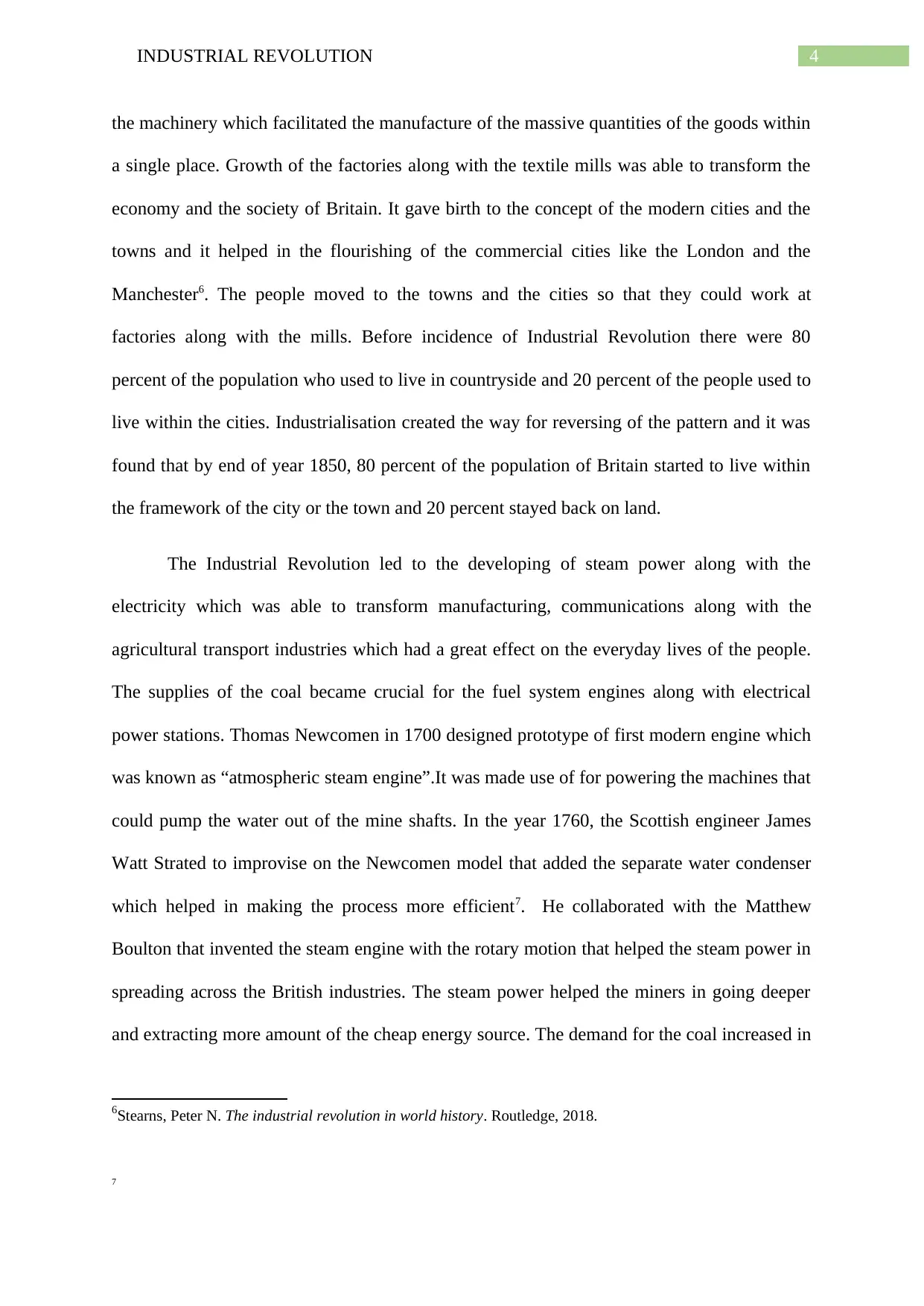
4INDUSTRIAL REVOLUTION
the machinery which facilitated the manufacture of the massive quantities of the goods within
a single place. Growth of the factories along with the textile mills was able to transform the
economy and the society of Britain. It gave birth to the concept of the modern cities and the
towns and it helped in the flourishing of the commercial cities like the London and the
Manchester6. The people moved to the towns and the cities so that they could work at
factories along with the mills. Before incidence of Industrial Revolution there were 80
percent of the population who used to live in countryside and 20 percent of the people used to
live within the cities. Industrialisation created the way for reversing of the pattern and it was
found that by end of year 1850, 80 percent of the population of Britain started to live within
the framework of the city or the town and 20 percent stayed back on land.
The Industrial Revolution led to the developing of steam power along with the
electricity which was able to transform manufacturing, communications along with the
agricultural transport industries which had a great effect on the everyday lives of the people.
The supplies of the coal became crucial for the fuel system engines along with electrical
power stations. Thomas Newcomen in 1700 designed prototype of first modern engine which
was known as “atmospheric steam engine”.It was made use of for powering the machines that
could pump the water out of the mine shafts. In the year 1760, the Scottish engineer James
Watt Strated to improvise on the Newcomen model that added the separate water condenser
which helped in making the process more efficient7. He collaborated with the Matthew
Boulton that invented the steam engine with the rotary motion that helped the steam power in
spreading across the British industries. The steam power helped the miners in going deeper
and extracting more amount of the cheap energy source. The demand for the coal increased in
6Stearns, Peter N. The industrial revolution in world history. Routledge, 2018.
7
the machinery which facilitated the manufacture of the massive quantities of the goods within
a single place. Growth of the factories along with the textile mills was able to transform the
economy and the society of Britain. It gave birth to the concept of the modern cities and the
towns and it helped in the flourishing of the commercial cities like the London and the
Manchester6. The people moved to the towns and the cities so that they could work at
factories along with the mills. Before incidence of Industrial Revolution there were 80
percent of the population who used to live in countryside and 20 percent of the people used to
live within the cities. Industrialisation created the way for reversing of the pattern and it was
found that by end of year 1850, 80 percent of the population of Britain started to live within
the framework of the city or the town and 20 percent stayed back on land.
The Industrial Revolution led to the developing of steam power along with the
electricity which was able to transform manufacturing, communications along with the
agricultural transport industries which had a great effect on the everyday lives of the people.
The supplies of the coal became crucial for the fuel system engines along with electrical
power stations. Thomas Newcomen in 1700 designed prototype of first modern engine which
was known as “atmospheric steam engine”.It was made use of for powering the machines that
could pump the water out of the mine shafts. In the year 1760, the Scottish engineer James
Watt Strated to improvise on the Newcomen model that added the separate water condenser
which helped in making the process more efficient7. He collaborated with the Matthew
Boulton that invented the steam engine with the rotary motion that helped the steam power in
spreading across the British industries. The steam power helped the miners in going deeper
and extracting more amount of the cheap energy source. The demand for the coal increased in
6Stearns, Peter N. The industrial revolution in world history. Routledge, 2018.
7
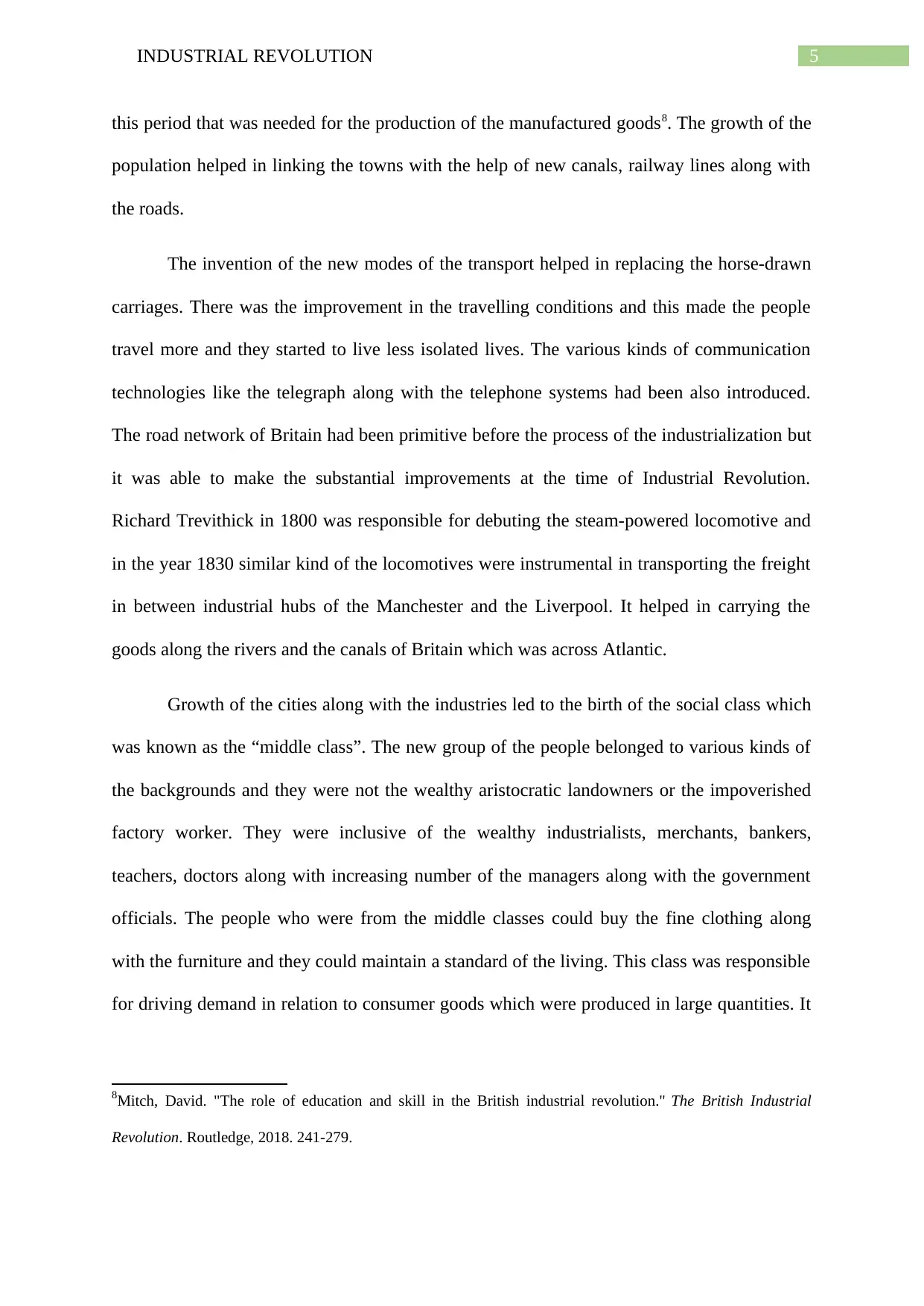
5INDUSTRIAL REVOLUTION
this period that was needed for the production of the manufactured goods8. The growth of the
population helped in linking the towns with the help of new canals, railway lines along with
the roads.
The invention of the new modes of the transport helped in replacing the horse-drawn
carriages. There was the improvement in the travelling conditions and this made the people
travel more and they started to live less isolated lives. The various kinds of communication
technologies like the telegraph along with the telephone systems had been also introduced.
The road network of Britain had been primitive before the process of the industrialization but
it was able to make the substantial improvements at the time of Industrial Revolution.
Richard Trevithick in 1800 was responsible for debuting the steam-powered locomotive and
in the year 1830 similar kind of the locomotives were instrumental in transporting the freight
in between industrial hubs of the Manchester and the Liverpool. It helped in carrying the
goods along the rivers and the canals of Britain which was across Atlantic.
Growth of the cities along with the industries led to the birth of the social class which
was known as the “middle class”. The new group of the people belonged to various kinds of
the backgrounds and they were not the wealthy aristocratic landowners or the impoverished
factory worker. They were inclusive of the wealthy industrialists, merchants, bankers,
teachers, doctors along with increasing number of the managers along with the government
officials. The people who were from the middle classes could buy the fine clothing along
with the furniture and they could maintain a standard of the living. This class was responsible
for driving demand in relation to consumer goods which were produced in large quantities. It
8Mitch, David. "The role of education and skill in the British industrial revolution." The British Industrial
Revolution. Routledge, 2018. 241-279.
this period that was needed for the production of the manufactured goods8. The growth of the
population helped in linking the towns with the help of new canals, railway lines along with
the roads.
The invention of the new modes of the transport helped in replacing the horse-drawn
carriages. There was the improvement in the travelling conditions and this made the people
travel more and they started to live less isolated lives. The various kinds of communication
technologies like the telegraph along with the telephone systems had been also introduced.
The road network of Britain had been primitive before the process of the industrialization but
it was able to make the substantial improvements at the time of Industrial Revolution.
Richard Trevithick in 1800 was responsible for debuting the steam-powered locomotive and
in the year 1830 similar kind of the locomotives were instrumental in transporting the freight
in between industrial hubs of the Manchester and the Liverpool. It helped in carrying the
goods along the rivers and the canals of Britain which was across Atlantic.
Growth of the cities along with the industries led to the birth of the social class which
was known as the “middle class”. The new group of the people belonged to various kinds of
the backgrounds and they were not the wealthy aristocratic landowners or the impoverished
factory worker. They were inclusive of the wealthy industrialists, merchants, bankers,
teachers, doctors along with increasing number of the managers along with the government
officials. The people who were from the middle classes could buy the fine clothing along
with the furniture and they could maintain a standard of the living. This class was responsible
for driving demand in relation to consumer goods which were produced in large quantities. It
8Mitch, David. "The role of education and skill in the British industrial revolution." The British Industrial
Revolution. Routledge, 2018. 241-279.
⊘ This is a preview!⊘
Do you want full access?
Subscribe today to unlock all pages.

Trusted by 1+ million students worldwide
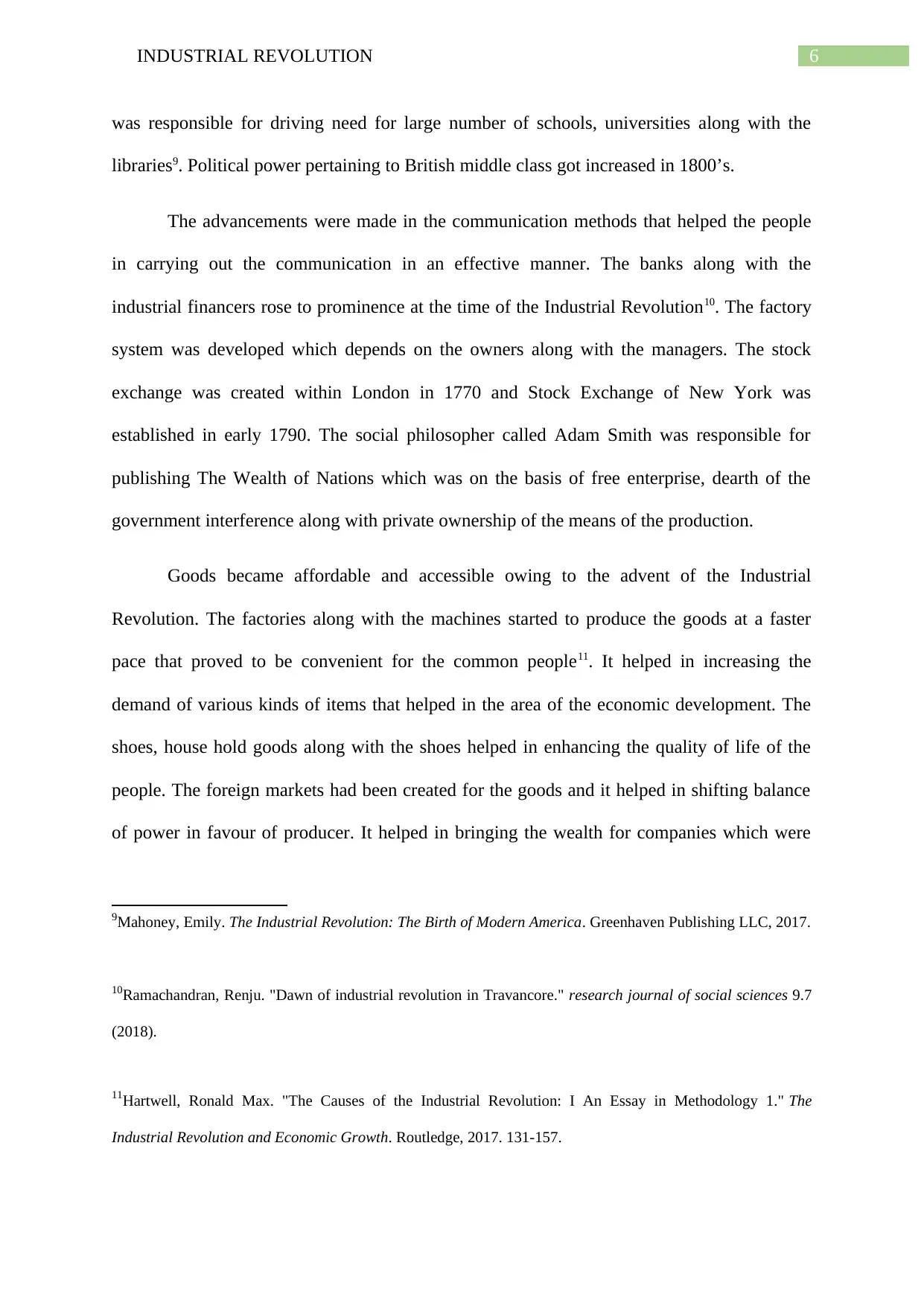
6INDUSTRIAL REVOLUTION
was responsible for driving need for large number of schools, universities along with the
libraries9. Political power pertaining to British middle class got increased in 1800’s.
The advancements were made in the communication methods that helped the people
in carrying out the communication in an effective manner. The banks along with the
industrial financers rose to prominence at the time of the Industrial Revolution10. The factory
system was developed which depends on the owners along with the managers. The stock
exchange was created within London in 1770 and Stock Exchange of New York was
established in early 1790. The social philosopher called Adam Smith was responsible for
publishing The Wealth of Nations which was on the basis of free enterprise, dearth of the
government interference along with private ownership of the means of the production.
Goods became affordable and accessible owing to the advent of the Industrial
Revolution. The factories along with the machines started to produce the goods at a faster
pace that proved to be convenient for the common people11. It helped in increasing the
demand of various kinds of items that helped in the area of the economic development. The
shoes, house hold goods along with the shoes helped in enhancing the quality of life of the
people. The foreign markets had been created for the goods and it helped in shifting balance
of power in favour of producer. It helped in bringing the wealth for companies which were
9Mahoney, Emily. The Industrial Revolution: The Birth of Modern America. Greenhaven Publishing LLC, 2017.
10Ramachandran, Renju. "Dawn of industrial revolution in Travancore." research journal of social sciences 9.7
(2018).
11Hartwell, Ronald Max. "The Causes of the Industrial Revolution: I An Essay in Methodology 1." The
Industrial Revolution and Economic Growth. Routledge, 2017. 131-157.
was responsible for driving need for large number of schools, universities along with the
libraries9. Political power pertaining to British middle class got increased in 1800’s.
The advancements were made in the communication methods that helped the people
in carrying out the communication in an effective manner. The banks along with the
industrial financers rose to prominence at the time of the Industrial Revolution10. The factory
system was developed which depends on the owners along with the managers. The stock
exchange was created within London in 1770 and Stock Exchange of New York was
established in early 1790. The social philosopher called Adam Smith was responsible for
publishing The Wealth of Nations which was on the basis of free enterprise, dearth of the
government interference along with private ownership of the means of the production.
Goods became affordable and accessible owing to the advent of the Industrial
Revolution. The factories along with the machines started to produce the goods at a faster
pace that proved to be convenient for the common people11. It helped in increasing the
demand of various kinds of items that helped in the area of the economic development. The
shoes, house hold goods along with the shoes helped in enhancing the quality of life of the
people. The foreign markets had been created for the goods and it helped in shifting balance
of power in favour of producer. It helped in bringing the wealth for companies which were
9Mahoney, Emily. The Industrial Revolution: The Birth of Modern America. Greenhaven Publishing LLC, 2017.
10Ramachandran, Renju. "Dawn of industrial revolution in Travancore." research journal of social sciences 9.7
(2018).
11Hartwell, Ronald Max. "The Causes of the Industrial Revolution: I An Essay in Methodology 1." The
Industrial Revolution and Economic Growth. Routledge, 2017. 131-157.
Paraphrase This Document
Need a fresh take? Get an instant paraphrase of this document with our AI Paraphraser
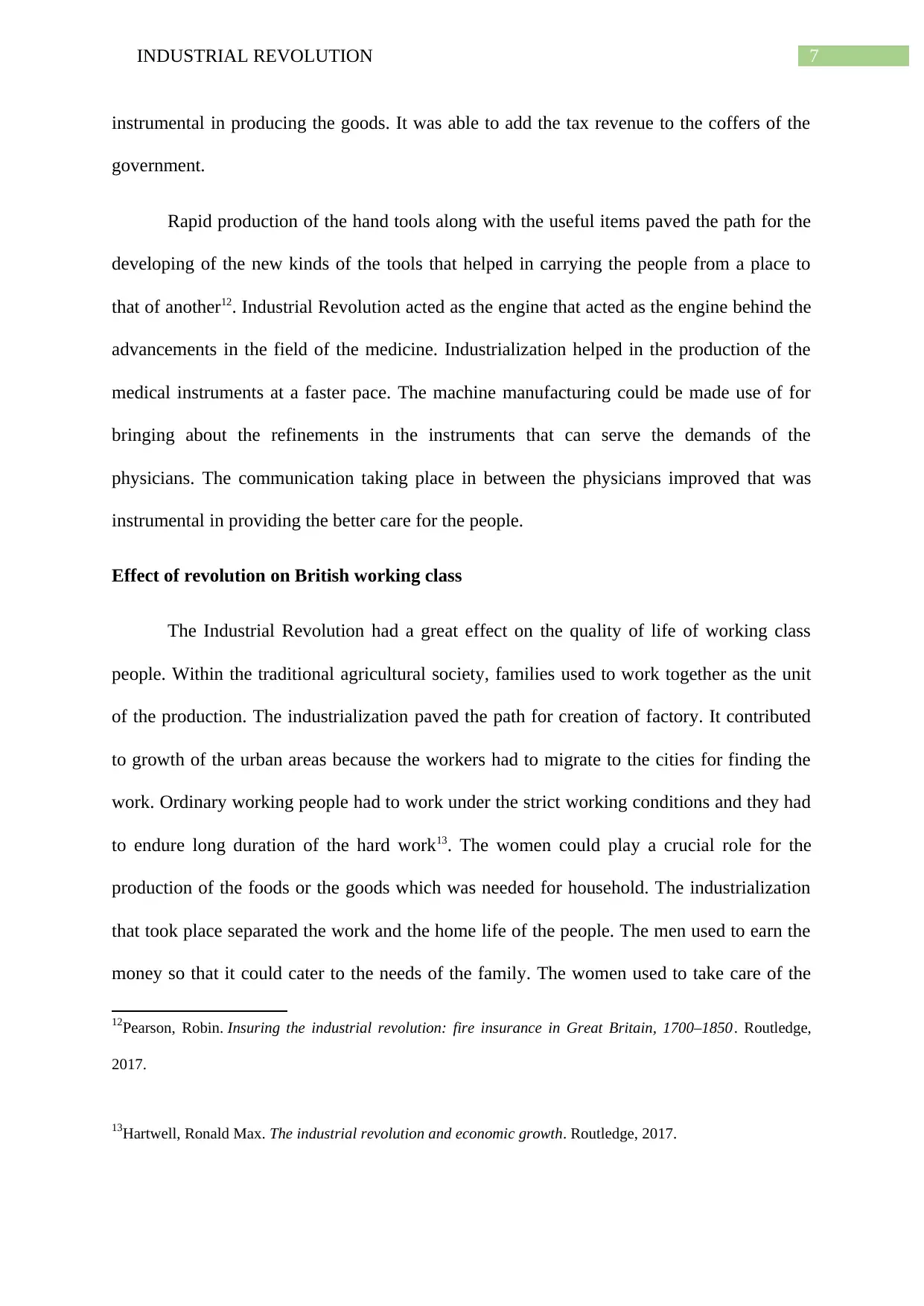
7INDUSTRIAL REVOLUTION
instrumental in producing the goods. It was able to add the tax revenue to the coffers of the
government.
Rapid production of the hand tools along with the useful items paved the path for the
developing of the new kinds of the tools that helped in carrying the people from a place to
that of another12. Industrial Revolution acted as the engine that acted as the engine behind the
advancements in the field of the medicine. Industrialization helped in the production of the
medical instruments at a faster pace. The machine manufacturing could be made use of for
bringing about the refinements in the instruments that can serve the demands of the
physicians. The communication taking place in between the physicians improved that was
instrumental in providing the better care for the people.
Effect of revolution on British working class
The Industrial Revolution had a great effect on the quality of life of working class
people. Within the traditional agricultural society, families used to work together as the unit
of the production. The industrialization paved the path for creation of factory. It contributed
to growth of the urban areas because the workers had to migrate to the cities for finding the
work. Ordinary working people had to work under the strict working conditions and they had
to endure long duration of the hard work13. The women could play a crucial role for the
production of the foods or the goods which was needed for household. The industrialization
that took place separated the work and the home life of the people. The men used to earn the
money so that it could cater to the needs of the family. The women used to take care of the
12Pearson, Robin. Insuring the industrial revolution: fire insurance in Great Britain, 1700–1850. Routledge,
2017.
13Hartwell, Ronald Max. The industrial revolution and economic growth. Routledge, 2017.
instrumental in producing the goods. It was able to add the tax revenue to the coffers of the
government.
Rapid production of the hand tools along with the useful items paved the path for the
developing of the new kinds of the tools that helped in carrying the people from a place to
that of another12. Industrial Revolution acted as the engine that acted as the engine behind the
advancements in the field of the medicine. Industrialization helped in the production of the
medical instruments at a faster pace. The machine manufacturing could be made use of for
bringing about the refinements in the instruments that can serve the demands of the
physicians. The communication taking place in between the physicians improved that was
instrumental in providing the better care for the people.
Effect of revolution on British working class
The Industrial Revolution had a great effect on the quality of life of working class
people. Within the traditional agricultural society, families used to work together as the unit
of the production. The industrialization paved the path for creation of factory. It contributed
to growth of the urban areas because the workers had to migrate to the cities for finding the
work. Ordinary working people had to work under the strict working conditions and they had
to endure long duration of the hard work13. The women could play a crucial role for the
production of the foods or the goods which was needed for household. The industrialization
that took place separated the work and the home life of the people. The men used to earn the
money so that it could cater to the needs of the family. The women used to take care of the
12Pearson, Robin. Insuring the industrial revolution: fire insurance in Great Britain, 1700–1850. Routledge,
2017.
13Hartwell, Ronald Max. The industrial revolution and economic growth. Routledge, 2017.
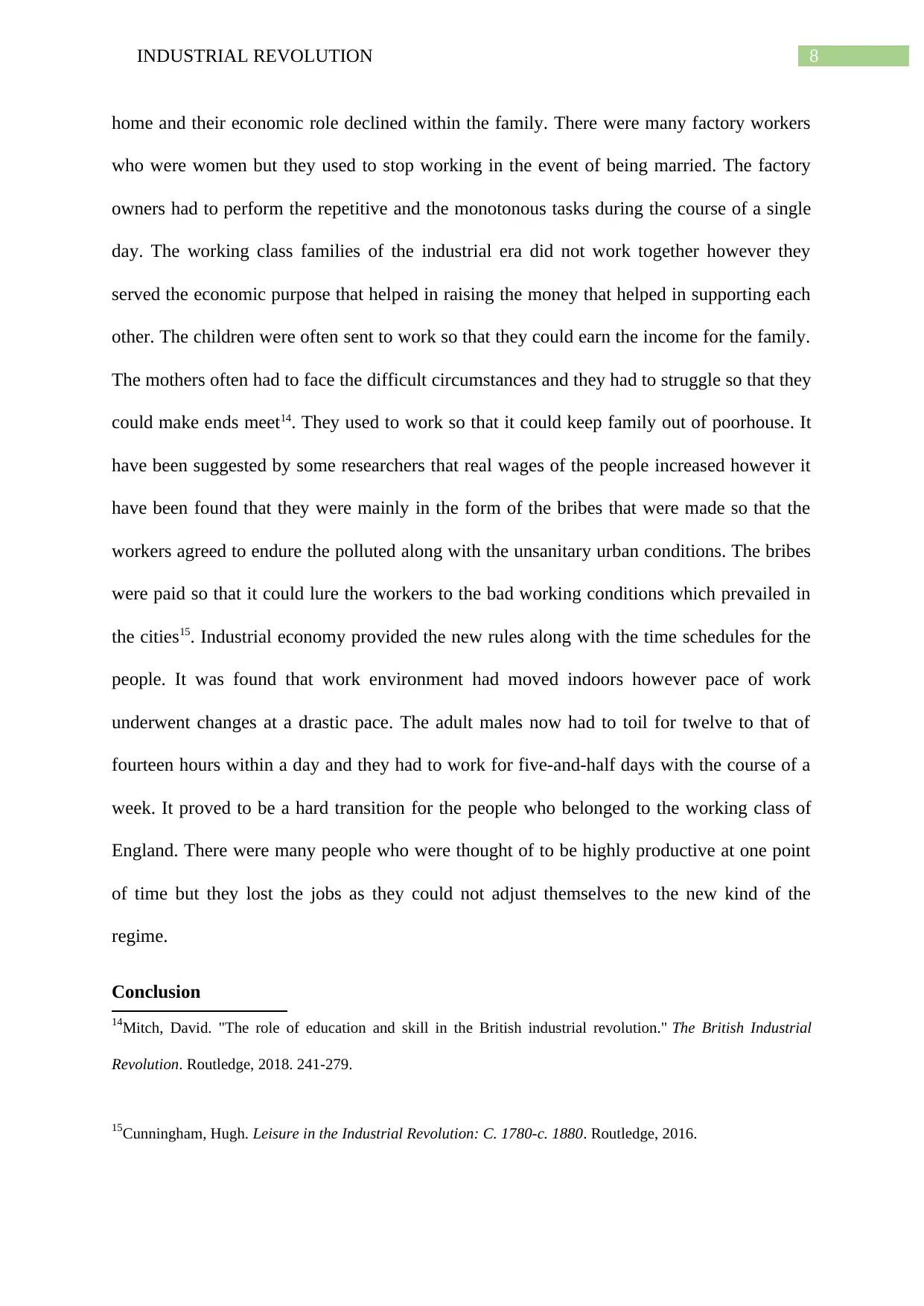
8INDUSTRIAL REVOLUTION
home and their economic role declined within the family. There were many factory workers
who were women but they used to stop working in the event of being married. The factory
owners had to perform the repetitive and the monotonous tasks during the course of a single
day. The working class families of the industrial era did not work together however they
served the economic purpose that helped in raising the money that helped in supporting each
other. The children were often sent to work so that they could earn the income for the family.
The mothers often had to face the difficult circumstances and they had to struggle so that they
could make ends meet14. They used to work so that it could keep family out of poorhouse. It
have been suggested by some researchers that real wages of the people increased however it
have been found that they were mainly in the form of the bribes that were made so that the
workers agreed to endure the polluted along with the unsanitary urban conditions. The bribes
were paid so that it could lure the workers to the bad working conditions which prevailed in
the cities15. Industrial economy provided the new rules along with the time schedules for the
people. It was found that work environment had moved indoors however pace of work
underwent changes at a drastic pace. The adult males now had to toil for twelve to that of
fourteen hours within a day and they had to work for five-and-half days with the course of a
week. It proved to be a hard transition for the people who belonged to the working class of
England. There were many people who were thought of to be highly productive at one point
of time but they lost the jobs as they could not adjust themselves to the new kind of the
regime.
Conclusion
14Mitch, David. "The role of education and skill in the British industrial revolution." The British Industrial
Revolution. Routledge, 2018. 241-279.
15Cunningham, Hugh. Leisure in the Industrial Revolution: C. 1780-c. 1880. Routledge, 2016.
home and their economic role declined within the family. There were many factory workers
who were women but they used to stop working in the event of being married. The factory
owners had to perform the repetitive and the monotonous tasks during the course of a single
day. The working class families of the industrial era did not work together however they
served the economic purpose that helped in raising the money that helped in supporting each
other. The children were often sent to work so that they could earn the income for the family.
The mothers often had to face the difficult circumstances and they had to struggle so that they
could make ends meet14. They used to work so that it could keep family out of poorhouse. It
have been suggested by some researchers that real wages of the people increased however it
have been found that they were mainly in the form of the bribes that were made so that the
workers agreed to endure the polluted along with the unsanitary urban conditions. The bribes
were paid so that it could lure the workers to the bad working conditions which prevailed in
the cities15. Industrial economy provided the new rules along with the time schedules for the
people. It was found that work environment had moved indoors however pace of work
underwent changes at a drastic pace. The adult males now had to toil for twelve to that of
fourteen hours within a day and they had to work for five-and-half days with the course of a
week. It proved to be a hard transition for the people who belonged to the working class of
England. There were many people who were thought of to be highly productive at one point
of time but they lost the jobs as they could not adjust themselves to the new kind of the
regime.
Conclusion
14Mitch, David. "The role of education and skill in the British industrial revolution." The British Industrial
Revolution. Routledge, 2018. 241-279.
15Cunningham, Hugh. Leisure in the Industrial Revolution: C. 1780-c. 1880. Routledge, 2016.
⊘ This is a preview!⊘
Do you want full access?
Subscribe today to unlock all pages.

Trusted by 1+ million students worldwide
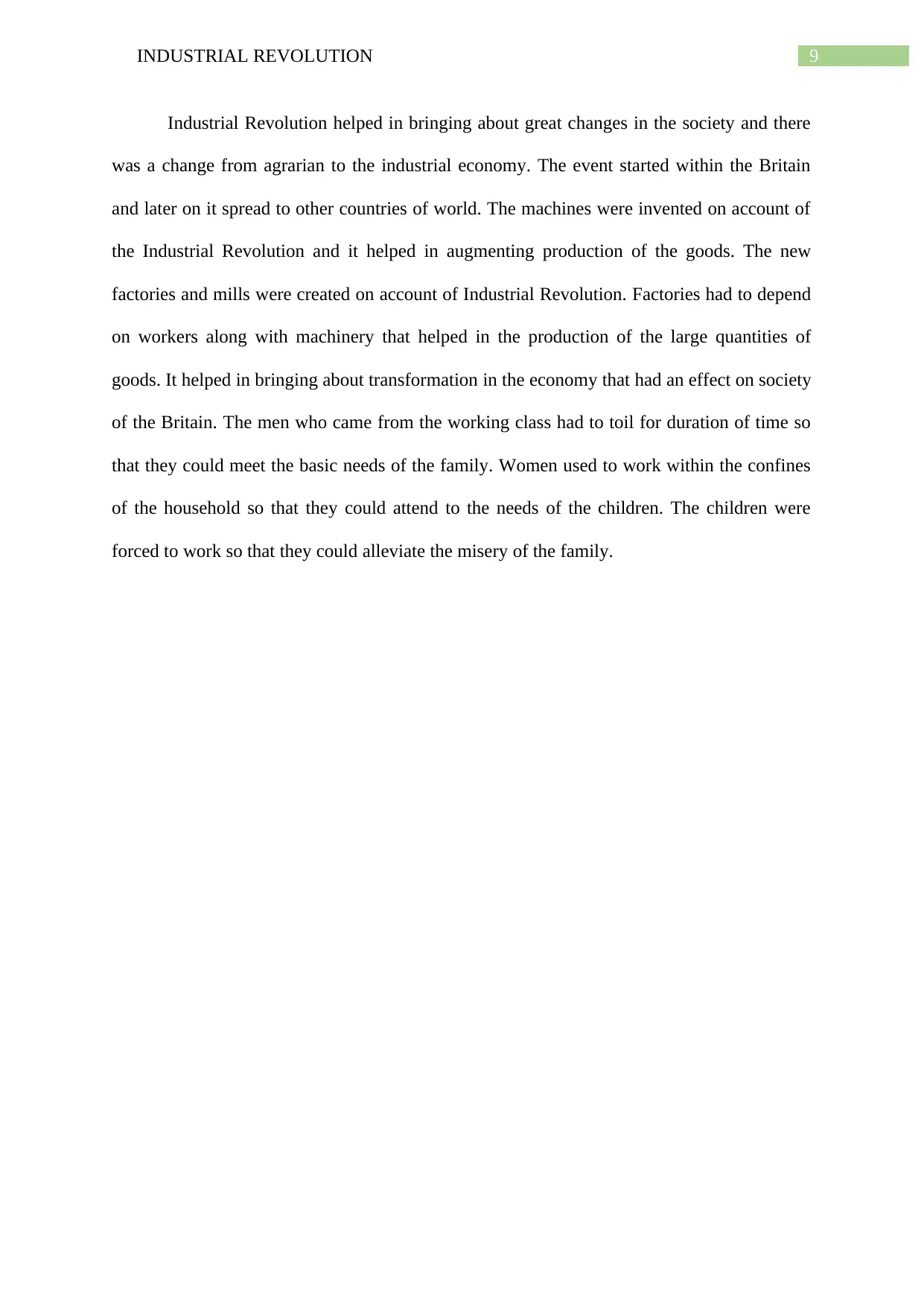
9INDUSTRIAL REVOLUTION
Industrial Revolution helped in bringing about great changes in the society and there
was a change from agrarian to the industrial economy. The event started within the Britain
and later on it spread to other countries of world. The machines were invented on account of
the Industrial Revolution and it helped in augmenting production of the goods. The new
factories and mills were created on account of Industrial Revolution. Factories had to depend
on workers along with machinery that helped in the production of the large quantities of
goods. It helped in bringing about transformation in the economy that had an effect on society
of the Britain. The men who came from the working class had to toil for duration of time so
that they could meet the basic needs of the family. Women used to work within the confines
of the household so that they could attend to the needs of the children. The children were
forced to work so that they could alleviate the misery of the family.
Industrial Revolution helped in bringing about great changes in the society and there
was a change from agrarian to the industrial economy. The event started within the Britain
and later on it spread to other countries of world. The machines were invented on account of
the Industrial Revolution and it helped in augmenting production of the goods. The new
factories and mills were created on account of Industrial Revolution. Factories had to depend
on workers along with machinery that helped in the production of the large quantities of
goods. It helped in bringing about transformation in the economy that had an effect on society
of the Britain. The men who came from the working class had to toil for duration of time so
that they could meet the basic needs of the family. Women used to work within the confines
of the household so that they could attend to the needs of the children. The children were
forced to work so that they could alleviate the misery of the family.
Paraphrase This Document
Need a fresh take? Get an instant paraphrase of this document with our AI Paraphraser
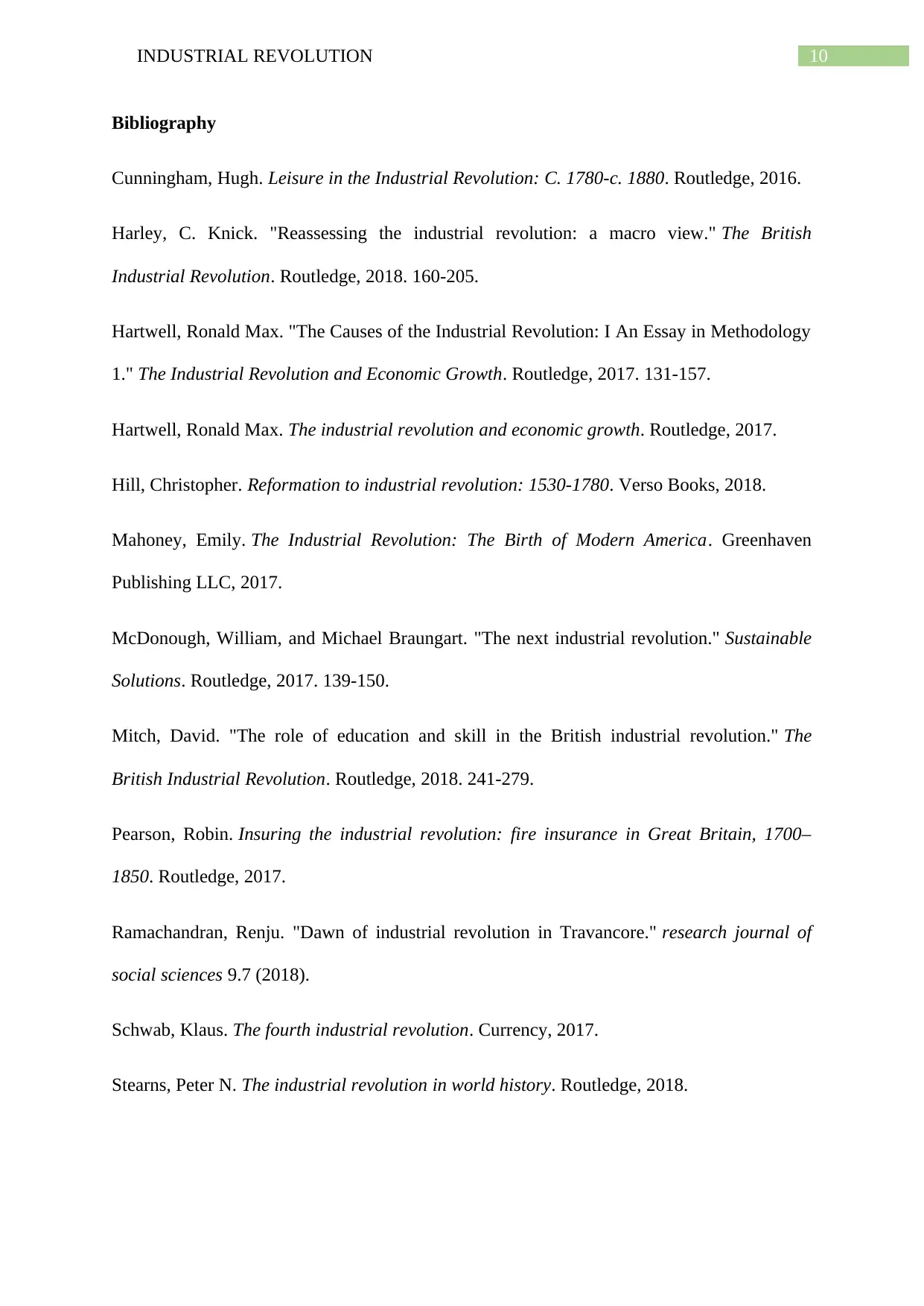
10INDUSTRIAL REVOLUTION
Bibliography
Cunningham, Hugh. Leisure in the Industrial Revolution: C. 1780-c. 1880. Routledge, 2016.
Harley, C. Knick. "Reassessing the industrial revolution: a macro view." The British
Industrial Revolution. Routledge, 2018. 160-205.
Hartwell, Ronald Max. "The Causes of the Industrial Revolution: I An Essay in Methodology
1." The Industrial Revolution and Economic Growth. Routledge, 2017. 131-157.
Hartwell, Ronald Max. The industrial revolution and economic growth. Routledge, 2017.
Hill, Christopher. Reformation to industrial revolution: 1530-1780. Verso Books, 2018.
Mahoney, Emily. The Industrial Revolution: The Birth of Modern America. Greenhaven
Publishing LLC, 2017.
McDonough, William, and Michael Braungart. "The next industrial revolution." Sustainable
Solutions. Routledge, 2017. 139-150.
Mitch, David. "The role of education and skill in the British industrial revolution." The
British Industrial Revolution. Routledge, 2018. 241-279.
Pearson, Robin. Insuring the industrial revolution: fire insurance in Great Britain, 1700–
1850. Routledge, 2017.
Ramachandran, Renju. "Dawn of industrial revolution in Travancore." research journal of
social sciences 9.7 (2018).
Schwab, Klaus. The fourth industrial revolution. Currency, 2017.
Stearns, Peter N. The industrial revolution in world history. Routledge, 2018.
Bibliography
Cunningham, Hugh. Leisure in the Industrial Revolution: C. 1780-c. 1880. Routledge, 2016.
Harley, C. Knick. "Reassessing the industrial revolution: a macro view." The British
Industrial Revolution. Routledge, 2018. 160-205.
Hartwell, Ronald Max. "The Causes of the Industrial Revolution: I An Essay in Methodology
1." The Industrial Revolution and Economic Growth. Routledge, 2017. 131-157.
Hartwell, Ronald Max. The industrial revolution and economic growth. Routledge, 2017.
Hill, Christopher. Reformation to industrial revolution: 1530-1780. Verso Books, 2018.
Mahoney, Emily. The Industrial Revolution: The Birth of Modern America. Greenhaven
Publishing LLC, 2017.
McDonough, William, and Michael Braungart. "The next industrial revolution." Sustainable
Solutions. Routledge, 2017. 139-150.
Mitch, David. "The role of education and skill in the British industrial revolution." The
British Industrial Revolution. Routledge, 2018. 241-279.
Pearson, Robin. Insuring the industrial revolution: fire insurance in Great Britain, 1700–
1850. Routledge, 2017.
Ramachandran, Renju. "Dawn of industrial revolution in Travancore." research journal of
social sciences 9.7 (2018).
Schwab, Klaus. The fourth industrial revolution. Currency, 2017.
Stearns, Peter N. The industrial revolution in world history. Routledge, 2018.
1 out of 11
Related Documents
Your All-in-One AI-Powered Toolkit for Academic Success.
+13062052269
info@desklib.com
Available 24*7 on WhatsApp / Email
![[object Object]](/_next/static/media/star-bottom.7253800d.svg)
Unlock your academic potential
Copyright © 2020–2026 A2Z Services. All Rights Reserved. Developed and managed by ZUCOL.





